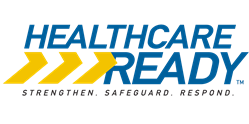
“Sustained investments and progress toward the capabilities outlined by these cooperative agreements and other regional initiatives in public health preparedness are necessary to achieve better outcomes after disasters,” said Tom Cotter, MPH, executive director of Healthcare Ready.
WASHINGTON (PRWEB)
January 31, 2023
Healthcare Ready has released a report to Congress calling for greater federal oversight, and increased communication, coordination and preparedness among those responsible for organizing and responding to public health emergencies. The nonprofit organization works to strengthen the U.S. health care system and assist all communities in planning for, responding to, and recovering from disasters and disease pandemics.
The report, Protecting National Public Health and Health Care Infrastructure for the Next Disaster, makes specific, straightforward recommendations to Congress and federal agencies to help ensure that the nation is prepared and equipped to respond to the next public health emergency.
The recommendations are based on an evaluation of current preparedness and response programs and activities authorized by the Public Health Service Act and later amendments. Launched in 2019, the evaluation includes lessons learned from the COVID-19 pandemic as well as prior public health emergencies.
Protecting National Public Health and Health Care Infrastructure for the Next Disaster finds that despite meaningful advancements in regional preparedness and response, variability in key areas around collaboration, communication, and equitable approaches to preparedness poses significant risks to the nation’s ability to equitably protect the health of all Americans for the next public health emergency to challenge the nation. Findings include the need to:
Improve communication and coordination across all stakeholders in preparedness and response, including public and private sector entities; federal agencies involved in health care preparedness and response; and federally funded programs and/or offices and recipients (or subrecipients) of federal cooperative agreements. Efforts in this area must include defining roles and responsibilities across agencies and programs, improving bidirectional information sharing, and strengthening partnerships across agencies and sectors.
Strengthen accountability by setting targets for all program goals and benchmarks for all standards of Administration for Strategic Preparedness and Response (ASPR) Hospital Preparedness Program (HPP) Cooperative Agreements and Centers for Disease Control and Prevention Public Health Emergency Preparedness Cooperative Agreements; and ensure monitoring and evaluation of progress with transparent reporting of results.
Strengthen efforts to apply an equity lens to public health and health care preparedness and response by enhancing community engagement; addressing health-related social needs; and conducting research that will build the capacity of resources that support individuals with access and functional needs.
Increase funding for federal preparedness and response to strengthen national and regional capabilities, help to achieve better outcomes after disasters, and contribute to ensuring our nation’s health security against future public health threats.
This report was undertaken by Healthcare Ready as part of a cooperative agreement with ASPR, as required by Section 210 of the 2019 Pandemic and All-Hazards Preparedness and Advancing Innovation Act (PAHPAIA) Public Law No. 116-22.
“Sustained investments and progress toward the capabilities outlined by these cooperative agreements and other regional initiatives in public health preparedness are necessary to achieve better outcomes after disasters, and to ensure our national security amidst future threats to public health,” said Tom Cotter, MPH, executive director of Healthcare Ready.
“Implementation of the recommendations in this report will help to build public will for a strong preparedness system, create more effective and efficient preparedness systems and, importantly, help us meet the needs of all Americans — especially populations that are at greater risk of being disproportionately affected by disasters,” he said.
Information gathering for this report took place between March 2021 to December 2021. Data was collected via literature review; 48 discussions with recipients (or subrecipients) of ASPR HPP Cooperative Agreements, CDC Public Health Emergency Preparedness Cooperative Agreements, and subject matter experts across health security, emergency logistics, community resilience, health policy, and health care delivery; and four focus groups held with community-based organizations and advocacy groups representing historically underserved communities in health care.
About Healthcare Ready
Healthcare Ready is a nonprofit organization established in 2007 to help strengthen the U.S. health care system and assist communities in planning for, responding to, and recovering from disasters and disease pandemics. It serves as a linkage point between industry, and local, state, and federal governments to help build resilient communities and safeguard patients before, during, and after public health emergencies. For more information, visit http://www.healthcareready.org or on Twitter @HC_Ready.
Share article on social media or email:

